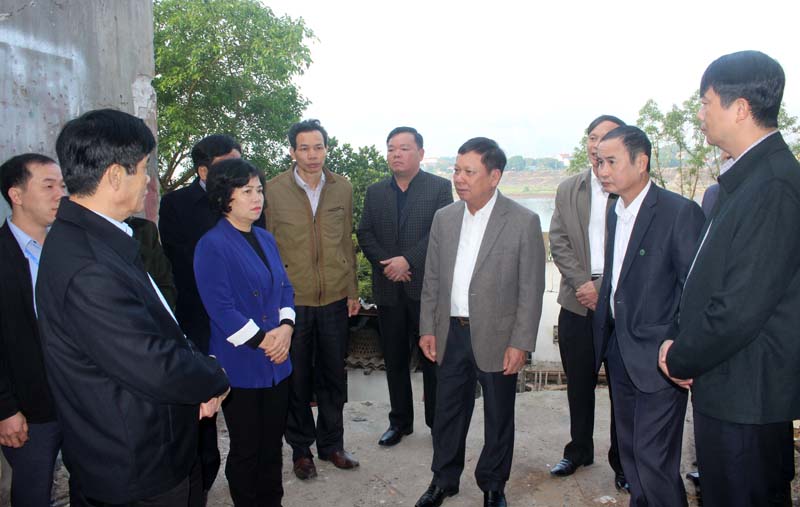
(HBO) – Bui Van Tinh, member of the Party Central Committee and Secretary of the Party Committee of Hoa Binh province, on December 18 met with households affected by landslides at residential area 26 in Dong Tien ward, Hoa Binh city. Nguyen Thi Oanh, head of the provincial Party Committee’s mass mobilisation board, and Nguyen Van Dung, Vice Chairman of the provincial People’s Committee, were present at the event.

Secretary of the
provincial Party Committee Bui Van Tinh and his entourage inspect a landslide
site at residential area 26 in Dong Tien ward, Hoa Binh city.
Due
to floods in 2017 and 2018 and water discharge of Hoa Binh Hydropower Plant, cracks
and landslides were found at residential area 26 in Dong Tien ward, Hoa Binh
city, at about 10a.m on July 30, 2017, which have greatly affected production
and daily life of local residents.
Given
this, the provincial People’s Committee sent forces and equipment to evacuate
people and assets to safer places. A total of 33 households have been moved to
Trung Minh commune’s resettlement area. Thirty two households have received
land for resettlement and 24 of them have begun housing construction.
Speaking
at the working session, Tinh expressed his sympathy over losses and
difficulties facing people at residential area 26 in Dong Tien ward. He asked
the provincial People’s Committee to reclaim land of households who have received
resettlement land and not allow any family to stay in areas vulnerable to
landslides. Households should be forced to move when necessary, he said.
Stressing
the need to promptly complete infrastructure to help locals soon stabilise
their lives, Tinh said each resident should get 15kg of rice within three
years.
Better
communication work will help improve public awareness of natural disaster
combat, he added, noting that sand and gravel gathering sites along the two
banks of the Da River must be dispersed.
Landslide
risks should be announced to avoid incidents in 2019 and the years to come at
residential areas 25 and 26 in Dong Tien ward, and mechanisms to support people
in residential areas in seeking jobs should be issued to help them stabilise their
lives in both short and long terms, he said.
Hoa Binh province is undergoing a dynamic transformation amid Vietnam’s national digital transition. Building on Poliburo’s Resolution No. 57-NQ/TW on breakthroughs in science, technology, innovation, and national digital transformation, the province has rolled out a wide range of practical action plans. A standout initiative is the "Digital Literacy for All” movement, an effort to ensure that no one is left behind in the digital era.
Hoa Binh province is undergoing a dynamic transformation in the wake of the national digital transformation movement. Building on Resolution No. 57-NQ/TW of the Politburo on breakthroughs in science, technology, innovation, and national digital transformation, the province has implemented a wide range of practical action plans. A standout initiative is the "Digital Literacy for All” movement ambitious effort to ensure that no one is left behind in the digital age.
With a spirit of unity and proactive problem-solving, the Party Committee, the government and the people of Dong Lai Commune (Tan Lac District) have made great strides in implementing the resolutions of the 24th Party Congress of the commune for the 2020 - 2025 term. Focusing on leadership and practical actions, the commune has brought the Party’s resolutions into daily life, creating strong impacts and pushing the local development forward.
Amid the nationwide push for digital transformation, young people in Hoa Binh Province are stepping up as dynamic pioneers, applying technology to enhance Youth Union operations and expand the reach of youth-led initiatives. Through creativity and adaptability, Youth Union organizations at all levels have introduced a series of practical solutions, contributing to modern governance and community development.
In recent years, An Nghia commune, located in Lac Son district, has stepped up administrative reform, focusing on improving the quality and efficiency of its single-window service unit for receiving and processing administrative procedures. These improvements have helped create favourable conditions for local residents and organisations to handle administrative procedures, contributing to the commune’s broader socio-economic development.
The Prime Minister-approved master plan to develop the multi-use value of forests ecosystems through 2030, with a vision to 2050, aims to improve the management and sustainable use of forest resources, create jobs, increase incomes, and improve the living standards of ethnic minorities, people in mountainous and remote areas, forest workers and those living near forests.



